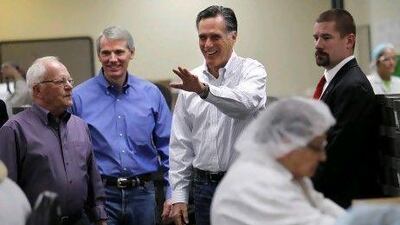WASHINGTON // Just six months before their party convention and less than nine months before the general election, US Republicans still do not have a presidential candidate they can confidently throw their weight behind.
Unhappy with the inability of Mitt Romney, the former Massachusetts governor, to cement his position as frontrunner and gather a critical mass of support behind him, some senior Republicans are even looking around for a new candidate to step in late in the game and appeal to independent voters.
Rick Santorum, the former Pennsylvania senator, Newt Gingrich, the former leader of the House of Representatives, and Ron Paul, the Texas congressman, are all seen, for separate reasons, as unable to hold the middle ground against Barack Obama, the US president, in November.
And should Mr Romney fail to win next week's Michigan primary - the state in which he was born and raised but in which he is trailing Mr Santorum in several opinion polls - his credentials as the only viable Republican challenger to Mr Obama are very much in doubt, said Jeffrey Weiss, a Washington-based political consultant and veteran of several Republican presidential races.
"Romney is not appealing to a lot of people at the moment," Mr Weiss said. "He's really got to win [Michigan]."
If he does not, some Republicans have started talking about convincing a new candidate - New Jersey governor Chris Christie has been mentioned, as has the governor of Indiana, Mitch Daniels - to run for the nomination.
The calculation is that with California and Texas, the two biggest states in terms of delegates, yet to hold their primaries, a new candidate could generate enough enthusiasm and win enough delegates to force a split vote at the Republican Convention in Florida in August.
If no candidate reaches the necessary 1,144 delegates to win outright, delegates at the convention will have to negotiate agreement there and then. Success then hinges on which candidate has managed to generate the most enthusiasm by then, hence the possibility for a new candidacy.
That at least is the theory. The reality is it remains a long shot at this point in the nomination process. Mr Daniels has already ruled himself out, while Mr Christie early endorsed Mr Romney.
And more broadly, Republican difficulties in settling on "the right horse" speaks to the fact that the party base has shifted and no candidate has yet emerged who has reflected this, said Bryon Allen, a Washington-based Republican pollster.
Traditional Democratic voters, the lower-middle and middle-class white voters, "have drifted into the Republican coalition" in recent years, Mr Allen said, which in turn has lost the upper income elites to the Democrats.
"What we've got is a nomination process where the candidates don't reflect that realignment very well and we didn't have the kind of candidate who gets the psychology of that lower-middle to middle-income voter very well."
Of the four candidates in the race, Mr Allen said Mr Gingrich might come closest to appealing to this group on policy but "even Republicans have grown tired of the whole Newt Gingrich act". Mr Paul's "absolutist" libertarianism, meanwhile, appeals to a far too narrow group for him to be a "legitimate option".
Mr Santorum, who in recent weeks has forged ahead in opinion polls to become the main challenger to Mr Romney, has taken the Republican narrative to the "extreme right", Mr Weiss said, with his comments on women's issues and abortion rights, and would not appeal to independents in a general election.
That leaves Mr Romney - and it sums up both his strength and weakness. It was always because the other candidates did not seem viable that Mr Romney for so long was seen as the Republican nominee-in-waiting. But being the best of a bad bunch does not spark the passions. The very real concern for the party is whether he can inspire people to vote in November.
His chances, as well as the chances of Republicans trying to inject a new candidate into the race, are now predicated on the outcome of the Michigan primary on February 28, said Mr Weiss.
"Can Romney get out the vote? He's got to appeal to the independents, but he can't even lock up the conservatives right now," said Mr Weiss. "He's got to lock up one of those."
Mr Allen was more sanguine. The "enthusiasm gap" - the ability to get people motivated enough to vote in November - will only be a problem in a close election. Mr Obama, he said, still needed to show some "robust" improvement on employment "if he is going to be re-elected."
"In a close election, having trouble getting out the Republican base would be a real problem. In a less close election, the independents are just ready to change what's going on because the economy is terrible."

